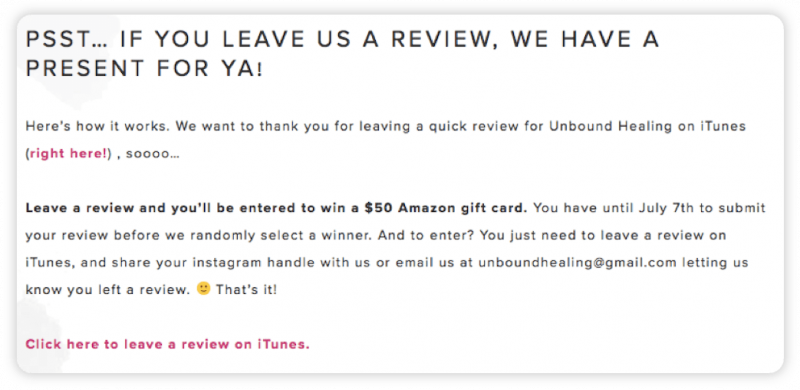- HOME
- Quick Reads
- 3 Strategies to Increase the Response Rate on Requests for Business Reviews
3 Strategies to Increase the Response Rate on Requests for Business Reviews
- 6 Mins Read
- Posted on September 24, 2019
- Last Updated on October 29, 2024
- By Natalie
With some combination of good business practices and luck, you’ll likely get plenty of unsolicited reviews about your business on platforms like Yelp. But you may find at some point that you need to directly ask customers for reviews. So are there strategies you can employ to increase the chances that those customers will agree to write for you?
If you’re asking this question, we’re one step ahead of you. Here are our three best practices for ensuring a positive ROI on your direct requests for testimonials:
1. Personalize Your Correspondence
If you’re a smaller business with the ability to send individual emails, your request might read something like:
Hi there, Emma!
I just saw your book’s been published on Amazon—and I’ve got to say, the cover looks even better than I’d imagined it would! Congratulations on getting to the bestseller list. It’s a fantastic book, so its popularity doesn’t surprise me. I’m grateful I got a chance to read it while helping out on the design end.
To that end, I know it helps writers feel comfortable hiring me for their book design when they hear other writers have had positive experiences with me. I was wondering if you’d mind answering a few quick questions for me? It should only take five minutes of your time.
Notice this letter employs a range of strategies: 1) Some (sincere!) compliments to warm Emma up, 2) A remark about how Emma’s answers will benefit other clients, 3) A promise that it will be a quick process, and 4) An estimate of how long it will take (we all take comfort in numbers).
Emma is likely to have a lot of positive things to say about your services—she’s on Amazon’s bestseller list, after all!—so you’ll be able to extract snippets from her answers for your testimonials.
Of course, businesses that deal with a larger volume of customers won’t be able personalize every interaction in this way—though they should try to incorporate the same four elements employed in the letter above (warm-up, reminder of the benefits, promise of brevity, and estimate of time). If possible, send the request from the email of the employee the client has worked most closely with. Absolutely use the customer’s name; and if you can, mention what their most recent interaction was with your company.
If you run a bigger business with a bigger client base, applications like Zoho Campaigns and Mailchimp allow you to create email campaigns that include links to your customer surveys. While these emails will go out to any number of your customers at once, they can still be customized and personalized to a degree—for example, they can be addressed to individual clients, as Zoho Campaigns allows you to do in a single click:

2. Send the Request at a Key Moment
Of course, exactly what that “key moment” is will depend on the nature of your business.
If you’ve sold a product or performed a service such as a haircut, carpet cleaning, accounting services, or construction work, send the survey out immediately after the work is performed: while the product is still new, their hair still looks great, and their carpet is still clean. Clients are most excited about these kinds of jobs immediately upon completion—just as they are most excited about a product immediately after purchase—so catch them when they’re at their most delighted.
However, if you’ve supplied a service that’ll take some time to fully evaluate (SEO optimization, for example), don’t ask for feedback immediately. You’ll want the real post-implementation data—not only to have a sense of your impact, but also so you can collect real numbers for your testimonial. In cases like this, wait between a few weeks and a few months to follow up—not so long that the client has forgotten about you, but long enough to be able to measure the effects and outcomes of your service.
The completion of a project and the moment your client begins to experience discernable results from your product or service are two great “landmark” occasions on which to request testimonials. Other advantageous moments include when they sign their first client, complete their first project, or fully fund their first campaign. In other words, reach out when your clients are feeling most successful because of you, and their feelings toward you are warmest.
3. Incentivize the Ask
We all like to get things. And we definitely like when getting them involves “winning.” In fact, we like these things so much that we’re often willing to put in the effort to sit down and write a testimonial for them.
Get where we’re going with this?
The women who run the Unbound Healing Podcast at Grass Fed Salsa know the importance of an incentive. Every listener who leaves a review is entered to win a $50 Amazon gift card:

Unbound Healing’s offer reads: Pssst… If you leave us a review, we have a present for ya! Here’s how it works. We want to thank you for leaving a quick review for Unbound Healing on iTunes (right here!), soooo… Leave a review and you’ll be entered to win a $50 Amazon gift card. You have until July 7th to submit your review before we randomly select a winner. And to enter? You just need to leave a review on iTunes, and share your instagram handle with us or email us at unboundhealing@gmail.com letting us know you left a review. That’s it! Click here to leave a review on iTunes.
Notice how easy they make it to click into iTunes. And notice they’ve put a time limit on their ask to get listeners to review more quickly.
Phoenix Capital Group makes it easy for customers to choose their preferred platform and leave a review. (Unfortunately, they don’t say what prize their reviewers will be “entered to WIN,” which makes the task of writing a testimonial a little less compelling):

Phoenix Capital Group’s offer reads: Phoenix Capital Group. Leave a Review. Pick one, leave a review, and you’ll be entered to WIN! With icon links to Google+, Better Business Bureau, and Yelp.
Even the happiest of customers is not always disposed to sit down and review the companies that most impact their lives. But rewards such as discounts, coupons, free services, swag (which doubles as a great marketing tool), or an entry into a drawing to win a much bigger prize will prompt many customers to finally take a moment and write down what they’ve been thinking about your business all along.
Local search directories make this strategy easy by allowing you to share discounts and coupons on their sites. And special coding on Facebook allows you to create and share special offers for your customers and followers only.
The better your offer, the more reviews you’ll receive. Just take care not to offer something that will, in the end, prove to be exorbitantly costly for you. (That’s one of the reasons coupons are such great incentives: They keep customers in your sales funnel.)
While we recognize the discomfort you might feel at the thought of asking for customer reviews, remember that what’s ultimately at stake for you in this process is a more thriving business. Remember, too, that customers are likely to feel that their opinions about your business are being heard and respected. And hopefully, that’ll be worth the few moments of unease you feel after you hit that “send” button.